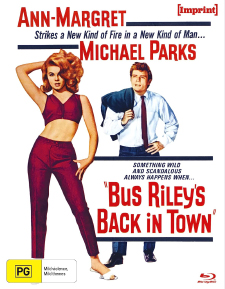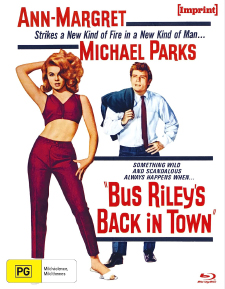Bus Riley’s Back in Town (Blu-ray Review)

Director
Harvey HartRelease Date(s)
1965 (June 9, 2023)Studio(s)
Universal Pictures (Imprint/Via Vision)- Film/Program Grade: C+
- Video Grade: A
- Audio Grade: B+
- Extras Grade: B-
Review
[Editor’s Note: This is a Region Free Australian Blu-ray import.]
Bus Riley’s Back in Town is a mid-1960s tale of a young man returning to his hometown after a three-year stint in the Navy, hoping to fall back into civilian life comfortably and make a success of himself. His return, however, offers him unanticipated challenges.
Bus Riley (Michael Parks) comes home to his small town full of optimism, ready to seek his fortune and enjoy living with his supportive family—hard-working mother (Jocelyn Brando) and sisters Paula (Mimsy Farmer) and high-schooler Gussie (Kim Darby). His mother knows that he’s a highly skilled mechanic and suggests that he investigate an opportunity to work at the local garage. He could earn a decent living at work he enjoys and fulfill his previously thwarted ambition to attend college by taking classes at night. Bus rejects the idea, thinking he can jump into a high-paying, prestigious job just for the asking.
He soon discovers that prospects are few and goes through a series of dead-end jobs. A mortician, whose hand makes its way onto Bus’ knee repeatedly, offers him a job as assistant at a good salary, but only if Bus agrees to live with him. Bus knows what he wants and turns him down. In a brief stint as a door-to-door salesman, he finds that lonely housewives are more interested in him than in the product he’s hawking.
Bus learns that former girlfriend Laurel (Ann-Margret) has married a rich man. Yet when she overhears that he’s back, she goes out of her way to track him down and throw herself at him. He thought he was over Laurel, but her attraction is strong and he finally succumbs, though with a growing sense of self-loathing. She lives in luxury, with Bus as her boy toy when her husband is out of town.
Gussie’s friend Judy (Janet Margolin) takes temporary refuge with the Rileys after her mother dies in a fire. Bus finds talking to Judy is easy and pleasant. Seeing how authentic Judy is compared to sexpot Laurel, he’s moved to decide what he wants his future to look like. Since being back home, he’s matured, seen the world cynically, tried to find a direction for his life, and engaged in relationships, one toxic and exploitative, the other sensitive and caring.
Ann-Margret, given top billing, plays a one-dimensional sexpot, her natural beauty flaunted in every scene. Laurel is all surface sensuality, with virtually no depth. Lounging suggestively, diving into a pool fully clothed so her breasts are shown off, driving an expensive sports car, or simply showing up to tantalize Bus with her obvious appeal, she’s little more than a stereotype of the “bad girl.” This was the image that the studio wanted Ann-Margret to convey, and the original script by playwright William Inge, based on his short story, was altered considerably to accomplish this purpose. Though Ann-Margret does her best with the role, she can’t make Laurel anything more than a caricature of female sensuality.
Michael Parks, good looking and with an easy charm, is likable as the title character. His early scenes, in particular, show him to be a loving son and brother, though he resists the sage advice of his mother. His relationship with Gussie reflects genuine affection. His scenes with Ann-Margret, however, are troublesome. Most of the problem is the script, but there are moments when he just stands around in her presence, looking like a helpless child. A stronger actor would have known how to put greater emotion into his facial expression and body language.
The film has some fine supporting performances. Jocelyn Brando as Mrs. Riley is warm, intelligent, with a sense of humor. Larry Storch has a brief role as a bartender. Brett Somers plays Judy’s alcoholic mother. Comic character actor Alice Pearce (On the Town) appears as a housewife fascinated by Bus’ sales pitch and handsome looks, and is a more than an eager-to-be-sold customer. Look for James Doohan (Scotty in the Star Trek franchise) as the character Les.
Bus Riley’s Back in Town was shot by director of photography Russell Metty on 35 mm color film and released in the widescreen aspect ratio of 1.85:1. The Blu-ray release is sourced from a new 2K scan. Picture quality is sharp, with details such as Ann-Margret’s long lustrous hair, items on the Riley’s breakfast table, sparkling sequins on one of Ann-Margret’s costumes, a vintage automobile, and purple smoke from the device Bus is selling well delineated. Ann-Margret is photographed quite attractively and her creamy smooth complexion and golden hair look terrific on color film. Occasional scenes feature actors having conversations in deep shadow, but these scenes fail to contribute to mood and seem a result of quick filming rather than a deliberate choice for dramatic effect.
The soundtrack is English 2.0 Mono LPCM. English SDH subtitles are an available option. Dialogue is clear and distinct throughout, which is important since the film emphasizes dialogue over action. Notable sound effects include Laurel and Bus splashing around in her swimming pool, ambient noise in a bar, a bus pulling into town, the engine of Laurel’s sports car, and incidental sounds of a garage mechanic working on a car. Ann-Margret’s voice is alternatively strident or sultry, depending on the scene. Richard Markowitz’s score has a 60s vibe but often gets in the way of the narrative. The music accompanying the opening sequence and title credits is bouncy and upbeat. It tends to be melodramatic in scenes with Laurel and Bus.
Bonus materials include the following:
- Audio Commentary by Film Historians Lee Pfeiffer and Paul Scrabo
- Film Professor Lucy Bolton on Ann-Margret (28:11)
Commentary – William Inge had never written a screenplay when he adapted his Bus Riley’s Back in Town. Inge wrote about families in crisis. After the script was altered significantly, he asked to have his name taken off it. The revised script softened the story. Michael Parks made his screen debut in Wild Seed and would later play Adam in The Bible: In the Beginning. With his brooding look, he was often compared to James Dean. The commentators note that the production design looks cheap, reflecting a desire by the studio to keep costs down. It also has the look of being filmed quickly. Half a dozen scenes were reshot to dilute the script, even though studios often did not want to spend a lot of money in post-production. The film’s advertising emphasized its sexual aspect. An overview of Ann-Margret’s career is provided. It’s noted that her agent nearly ruined her career by steering her into bad films and rejecting good opportunities. Her husband, Roger Smith, eventually managed her career and Ann-Margret appeared in better films, including Carnal Knowledge, for which she received an Academy Award nomination. Viva Las Vegas is regarded as one of her better films because of her great chemistry with Elvis Presley.
Film Professor Lucy Bolton on Ann-Margret – Early in her discussion, Prof. Bolton notes, “As soon as music starts, Ann-Margret transforms into the kind of crazy, wild, jerky, jumpy, squealing performer.” She was pitched in the early 60s as a female Elvis. In Bus Riley, she’s a sexpot. She sets about forcing herself on Bus. She’s a sex kitten, with a trendy, sensual look. Ann-Margret’s career is highlighted. George Burns was an early mentor and promoter, and they did an act together. She was signed to a seven-year contract by 20th Century Fox. Some of her films include Pocketful of Miracles, Tommy, Magic, and Grumpy Old Men. In Carnal Knowledge, she displayed an emotional range she had never shown on screen before. She had a bad on-stage accident in 1972 that required facial reconstruction surgery. Bus Riley is a “wonderful showcase for Ann-Margret at that time in her life.”
Bus Riley’s Back in Town suffers from a script that tries both to exploit Ann-Margret’s sensuality and to limit graphic content. The mid-1960s was a period of transition for the American film industry. The Production Code, though outdated, was still in force, so sexual content and adult themes had to be handled with finesse. The film is thus a half-hearted effort, hampered by censorship and William Inge’s gutted script. Michael Parks is good, but it’s Ann-Margret who heats up the screen.
- Dennis Seuling

